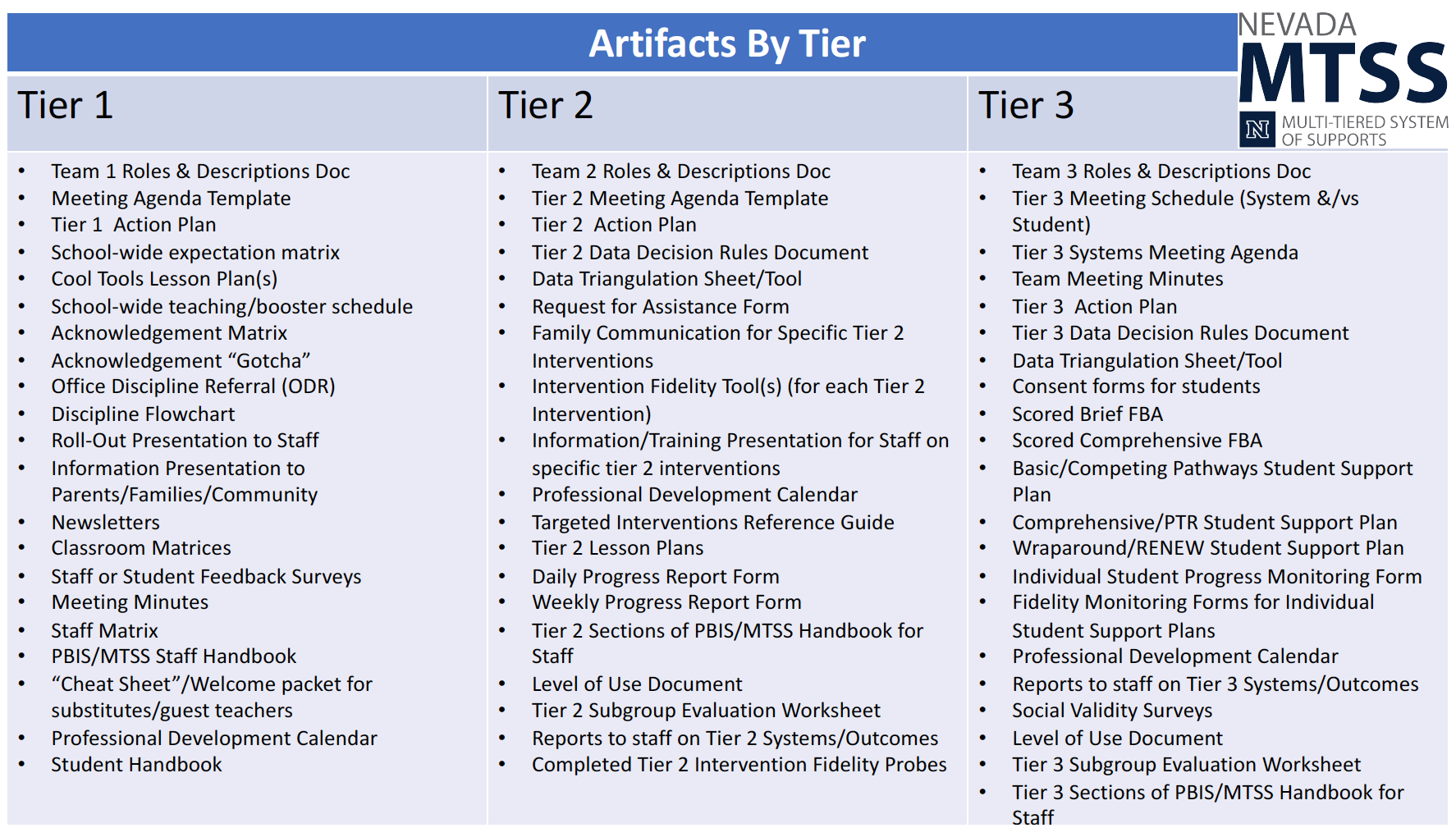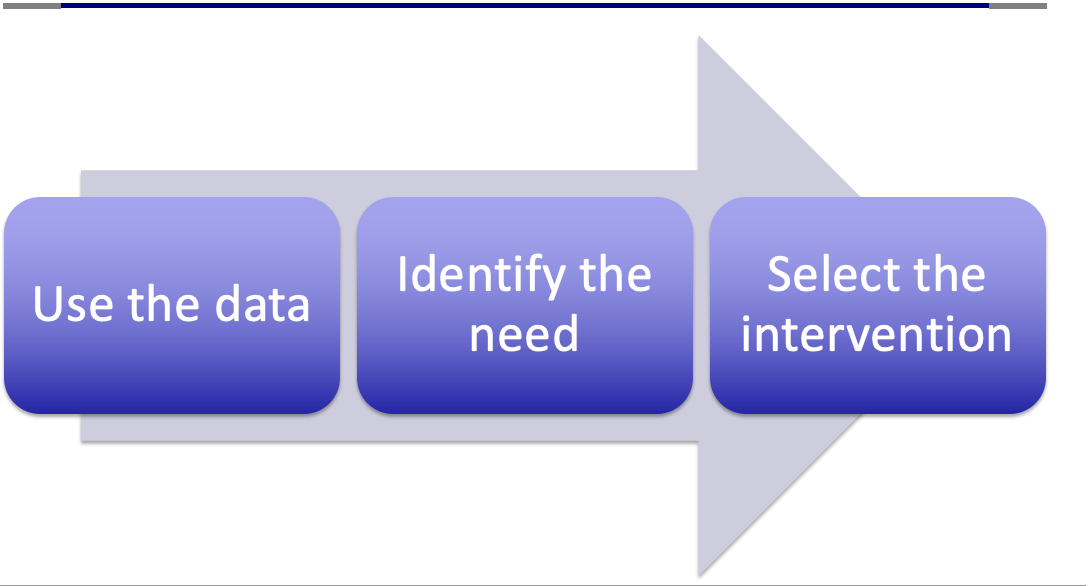- Washoe County School District
- Resource Center by Tiers
Multi-Tiered System of Supports
Page Navigation
Artifacts by Tier
-

Artifacts by Tier
This tool allows for quick reference to what type of site/district based artifacts are found at each tier.
Tier 1 System Resources
-
Tier 1 PBIS Resources
SWPBIS: Critical Elememts:
1. Matrix: operational definition of behavioral expectations across various locations. Expectations are observable and measure (e.g., Be Safe, Be Responsible, Be Respectful) behaviors which provide social significance and meet the needs of the climate and culture of a community where ALL are seen, heard and celebrated.
- Kate Smith ES Example
- Dilworth MS Example
- Sample PBIS School Teaching Matrix of Expectations
- Sample Virtual Matrix-ES
- Smaple Virtual Matrix-MS/HS
- Sample A HS Matrix
- Sample B HS Matrix
2. Teach/Re-Teach Expectations: consistent teaching/re-teaching of schoolwide expectations is paramount to the success of behavioral skill(s) fluency. Both contextual fit for age/grade and explicit instruction of each expectation on location are important components to the work. Typically, instruction is done at the beginning of the school year; however, it is equally important to plan for opportunities for re-teaching throughout the year (e.g., after breaks, long weekends, intruptions in the school year, or when schoolwide data indicates).
3. Reinforce Expected Behavior: acknowledging when one or groups are demonstrating prosocial expected behavior. Providing specific feedback on the prosocial skill(s) increases the probability of the behavior occurring again. Rule of thumb: "Behavior goes where reinforcement flows"--reinforce prosocial behaviors at least 5 times more than correcting inappropriate behavior.
- No Cost Rewards (Elementary)
- No Cost Rewards (Secondary)
- Behavior Specific Praise 1-2-3
- Acknowledging Appropriate Behavior
- 60 Incentive ideas for Distance Learning
- Blank Recognition Sheet
- Acknowledgement Matrix
- Libby Booth Acknowledgement Matrix
4. Responding to Inappropriate Behavior: accessing outline Progessive Discipline Matrix to quickly, swiftly, and consistently respond to inappropriate behavior. It is important to consult with the WCSD Student Behavior Manual/Matrix in escalated situations.
5. Data-Based Decision Making: data reviews/drill downs should be conducted at least monthly by site PBIS teams to monitor schoolwide behavioral data. Recommended filters: behavioral expectation/skill, location, day/week/month, and time.
Potential guiding questions to assist in reflection:
- Do we have a system concern (less than 80% of students meet expectations)?
- Is a small group of students in need of supplemental support and/or a higher dosage of feedback on performance? If so, what skill(s) and how? *Group Problem-Solving Form
- How are we addressing behavior proportionally in our student population? Are we over/under identifying any specific student(s) or population(s)?
- How might staff need further professional development in our PBIS implementation?
- Are we doing what we said we were going to do and how do we know?
- What information can assist Tier 1 implementation of the Early Warning System?
For any inquiries or support, please contact Stephanie Keating or Aaron Grossman from the MTSS/SEL Department
-
Center on PBIS-Guidance for Site Leadership Teams
Tier 2 System Resources
-
Tier 2 Resources

Using the lens of "using data helps us identify the need so we can select the intervention" will help teams make sound and true data-based decisions.
Site-based teams may include Tier 2 PBIS team (which oversees the system) and Collaborative Teacher Teams (e.g., PLC) who may review data on a granular scale to identify potential needs. Both teams work in collaboration to determine next steps and possible intervention(s). Once an intervention has been decided upon, the T2 PBIS team and Collaborative Teacher Team, should be collecting appropriate progress monitoring and fidelity of implementation data to drive further decision- making points.
-
Universal Screeners
Universal Screeners-Behavior should be conducted and reviewed by the site PBIS T1 and T2 teams at least 3 times (Fall, Winter, Spring). Teams will want three points of data, when identifying those in need of additional support.
Potential Universal Screeners:
- Attendance
- Early Warning System
- Office Discipline Referrals
- Nurse's Log
- Counselor's Log
- Teacher Nomination
- Parent Nominiation
- Student Self-Advocacy
- Grades/Academic Performance
- Strengths based Inquiries
For any inquiries or support, please contact Stephanie Keating or Mallory Foley from the MTSS/SEL Department
Tier 3 System Resource
-
Tier 3 Resources (System)
Systems
- Mulit-Disciplinary Team based problem-solving
- Data-based decision-making system
- Sustainability focus (redefining roles, district data review, etc.)
Data
- Data used for engagement and action planning with team
- Data tools are strengths/ needs based
- Multiple perspectives and settings captured in data
- Showing small increments of change at team meetings
Practices--further information see Behavioral Health and Management resource paga (Click Here)
- Students have access to all levels of SWPBIS.
- FBA/BIP is an essential skill set for implementers.
- Engagement and team development are critical elements.
- Team facilitation is an essential skill set (for complex FBA/BIP & wraparound)
- Wraparound process/elements create ownership/context for effective interventions including FBA/BIP
- Assess/monitor fidelity with families
Additional Resources
-
Equity & Diversity within PBIS
- A 5-Point Intervention Approach for Enchancing Equity in School Discipline (PDF) Center on PBIS
- Embedding Culturally Responsive Practices in Tier 1 (PDF) Center on PBIS
- Examples of Engaging Instruction to Increase Equity in Education (PDF) Center on PBIS
- If Discipline Referral Rates for the School as a Whole are Reduced, Will Rates for Students with Disabilities also be Reduced? (PDF) Center on PBIS
- Key Elements of Policies to Address Discipline Disproportionality: A Guide for District and School Teams (PDF) Center on PBIS
- PBIS: Cultural Responsiveness Field Guide: Resources for Trainers and Coaches (PDF) Center on PBIS
- Using Discipline Data within SWPBIS to Idenify and Address Disproportionality: A Guide for School Teams (PDF) Center on PBIS
-
External Network Resources
Center on PBIS: Funded by the U.S. Department of Education’s Office of Special Education Programs (OSEP) and the Office of Elementary and Secondary Education (OESE), the Technical Assistance Center on PBIS supports schools, districts, and states to build systems capacity for implementing a multi-tiered approach to social, emotional and behavior support".
Florida PBIS Project: "The FLPBIS Project offers training and technical assistance, including evaluation resources, to develop systems that sustain a practical, positive and proactive PBIS framework".
PBIS Maryland: "PBIS Maryland was created to assist educational systems in Maryland to build the capacity to adopt and sustain a multi-tiered framework for implementing evidence-based practices to increase the success of all students".
Midwest PBIS: Mission of the Midwest PBIS Network is to "Improve student outcomes by increasing the quality, fidelity, and sustainability of schools implementing multi-tiered behavioral supports".
The Nevada MTSS Project: The Nevada Department of Education (NDE) and the Nevada PBIS Technical Assistance Center plan to build capacity to establish, scale-up, and sustain a Multi-tiered Systems of Support (MTSS) in many of Nevada Local Educational Agencies (LEAs).
Nevada Positive Behavior Support Technical Assistance Center: The NV-PBS TA Center provides technical assistance to districts/schools participating in the School Climate Transformation Grant (SCTG) with the implementation of SWPBIS.
Northwest PBIS: "Our mission, to establish and sustain safe, positive and inclusive learning environments for all".
Wisconsin PBIS Network: "The Wisconsin Response to Intervention (RtI) Center was created to assist Wisconsin’s educational systems to build capacity, adopt and implement high-quality practices, make informed decisions, ensure sustainability of efforts, and increase success for all students".
Listed are state, regional, and national resource centers. Each resource site contains some information that is freely available, while other information may require a cost. All organization and company names are trademarks™ or registered® trademarks of their respective holders. Use of them does not imply any affiliation with or endorsement by them.

